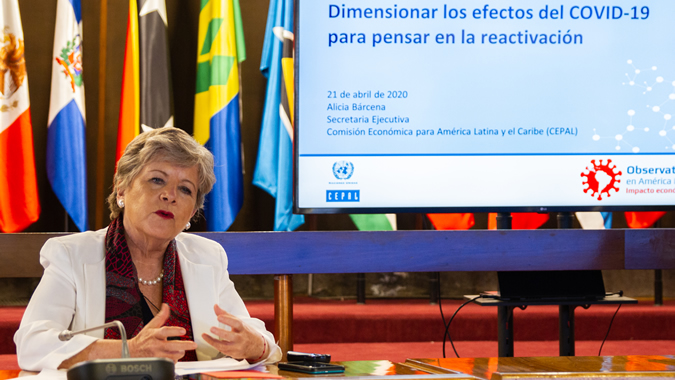Alicia Bárcena Encouraged Caribbean Countries to Advance Towards Less Unequal and More Caring Societies, Leaving No One Behind
Work area(s)
ECLAC’s Executive Secretary participated today in a virtual meeting on the role of Social Development Ministries in the Caribbean in light of the COVID-19 pandemic, which was organized jointly by the Secretariat of Welfare of Mexico and the UN Regional Commission.

The Executive Secretary of the Economic Commission for Latin America and the Caribbean (ECLAC), Alicia Bárcena, encouraged Caribbean countries to commit to social well-being, at a virtual meeting held today on the role of Caribbean Social Development Ministries in the crisis that the world and region are currently undergoing as a result of the COVID-19 pandemic.
The meeting drew the participation of 18 representatives from English, French and Dutch-speaking Caribbean countries and territories: Anguilla, Antigua and Barbuda, Aruba, the Bahamas, Curaçao, Dominica, Grenada, Guadalupe, Guyana, the Turks and Caicos Islands, United States Virgin Islands, Jamaica, Montserrat, Saint Kitts and Nevis, Saint Lucia, Sint Maarten, Suriname, and Trinidad and Tobago. Other virtual attendees included the UN Resident Coordinators from the subregion as well as representatives of UN agencies, funds and programs and of the Caribbean Community (CARICOM), the Association of Caribbean States (ACS), and the Organisation of Eastern Caribbean States (OECS). The meeting was organized by the Secretariat of Welfare of Mexico, in its capacity as chair of the Presiding Officers of the Regional Conference on Social Development in Latin America and the Caribbean, and by ECLAC.
The gathering’s main objective was to foster a space for collaboration and mutual support, sharing both problems and challenges related to the pandemic as well as accumulated knowledge, progress, needs, and possible spaces for joint work at a regional level.
The meeting was inaugurated by Alicia Bárcena, ECLAC’s Executive Secretary, who made a welcome speech and also gave a presentation in which she addressed the region’s socioeconomic situation and social protection measures in the context of the current health crisis.
In her remarks, the senior United Nations official affirmed that the COVID-19 pandemic has had a tremendous impact on the economic, social, physical and mental state of each individual.
“We are aware that with the coronavirus, we are not just facing a health emergency. That is why we have gathered everyone together, to share with you ECLAC’s preliminary estimates on the socioeconomic impact of the crisis and to spur a discussion about the best way to respond to the real challenges that our communities are facing,” she indicated.
ECLAC’s Executive Secretary recalled that even before the spread of COVID-19, the region’s social situation was deteriorating.
“Inevitably, the virus will affect countries in different ways, depending on their respective capacities to respond to the illness and on the resources available to cope with it at a national level. In that sense, we are aware that in the Caribbean, despite decades of progress on human development, countries face growing poverty and income inequality,” she stressed.
Bárcena added that the measures needed to control propagation of the virus will profoundly affect the well-being of vulnerable groups, at a time when social protection systems offer limited coverage due to heavy external debt burdens and threats such as climate change and natural disasters.
“In urgent circumstances such as those we face now, it is you, the leaders responsible for social well-being, who are charged with finding solutions to the needs of people who live in the street, persons with disabilities, migrants and older persons,” she added.
Furthermore, Alicia Bárcena noted that emergency situations such as these further expose the inequalities between men and women, and the heavier workload that women must bear, including in difficult circumstances.
“We are especially concerned that the tourism sector, which is one of the sectors most affected by the pandemic, concentrates the greatest proportion of women in the workforce, with an average of around 70%. At ECLAC, we estimate that if the travel ban remained in place for one or two more months, touristic activity in the Caribbean would contract by 8%, 17% or 25%, respectively, in 2020. Therefore, protecting women’s livelihoods is a very real challenge that must be addressed,” she emphasized.
On this occasion, the Executive Secretary highlighted the creation of ECLAC’s COVID-19 Observatory, which offers detailed information on the policies being adopted at a regional and global level, which can be accessed to see information broken down by country.
Finally, ECLAC’s most senior representative sustained that solidarity and collective responsibility are key to containing and confronting the pandemic, and she warned that the crisis may deepen expressions of discontent, mistrust and disaffection with democracy, which constitutes a significant risk to social cohesion.
For that reason, she concluded, “it is urgently necessary to advance towards less unequal and more caring societies, leaving no one behind.”
More information:
Related content

COVID-19 Pandemic Will Lead to the Biggest Contraction in Economic Activity in the Region’s History: A -5.3% Drop in 2020
ECLAC released new growth projections for Latin American and Caribbean countries. It underscores that in the medium term, this crisis will provoke structural changes in the organization of production…

PPT- Latin America and the Caribbean and COVID-19: The socioeconomic situation and social protection measures
Alicia Bárcena, Executive Secretary, ECLAC 21 April 2020
Subregional headquarter(s) and office(s)
Type
Country(ies)
- Caribbean
